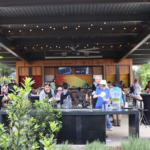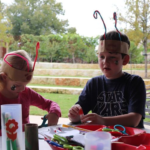Incredible Edible Insect Event in San Antonio a ‘tasteful’ experience
Writer: Paul Schattenberg, 210-859-5752, [email protected]
Contact: Molly Keck, 210-631-0400, [email protected]
SAN ANTONIO — More than 300 people attended the recent Incredible Edible Insect Event held in the culinary garden area of the San Antonio Botanical Garden.
The event, which included a four-course tasting of foods made with insect-based ingredients, was presented by the Texas A&M AgriLife Extension Service in Bexar County in collaboration with the botanical garden and other nature-oriented organizations.

Each tasting was of a chef-demonstrated recipe in which insects or insect-based ingredients were used. Featured chefs included Dave Terrazas, San Antonio Botanical Garden culinary and wellness specialist; Stephen Poprocki, Texas Black Gold Garlic; Joshua Schwenke, Gastronomy Live Events; and Michael Grimes, Southern Grit.
“We wanted to introduce attendees to the viability and sustainability of consuming insects or foods made with insect-based ingredients, which is known as entomophagy,” said Molly Keck, AgriLife Extension entomologist, Bexar County.
“We thought one of the best ways to do this would be to prepare items they could sample and taste for themselves to find out just how edible they really were.”
Keck said the samplings included sweet potato mousse made with fire ants, as well as a fire ant queso served with Chirp Chips, tortilla chips made with cricket flour.
The event also included presentations on the sustainability and nutritional value of insects, along with a variety of youth activities.
Keck and Robert Nathan Allen spoke at the event. Allen is founder of Little Herds, an Austin-based nonprofit that promotes using insects for food and feed as an environmentally sound and economically viable approach to nutrition.
Allen spoke about the impending crisis in space available for global food production. He noted how insects, whose production takes less space and fewer resources, can be vital in a sustainable solution to world hunger.
In Keck’s presentation, she noted while eating insects isn’t an aspect of the American culture or diet, people in 80 percent of the world’s countries regularly consume insects or food made from insect-based ingredients.
“It’s just a matter of people being open to the idea and knowing insects are a great source of protein and can improve both flavor and texture in many recipes,” she said.
To illustrate her point, she noted more than 115 people participated in the samplings at the event.
“The Chirp Chips made a positive impression on many of them,” she said. “I had several people ask me where they could find them.”
The event also included educational presentations on edible plant parts, pollinators and insects used to feed animals.

“Along with the samplings, we had youth activities such as cricket races, face painting and painting with cochineal — a red dye derived from insects,” Keck said.
She noted painting with cochineal was one of the more popular youth activities and was also of historic significance to San Antonio in that the original Spanish missions were likely to have been painted using a similar type of dye.
“We have presented different entomophagy events and have been pleased with the response,” Keck said. “While it will take some time for people in the U.S. to come around to the idea of eating insects, we hope these types of programs will show them doing so is not only practical and sustainable, it can also be very tasty.”


